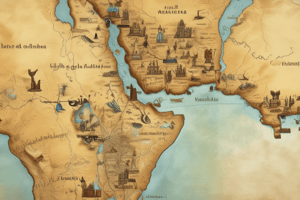Podcast
Questions and Answers
Who was the Songhai ruler known for expanding the empire and forming a professional army?
Who was the Songhai ruler known for expanding the empire and forming a professional army?
- Leo Africanus
- Sonni Baro
- King Mohammad I (correct)
- Sunni Ali
What is the meaning of the dynastic title Askiya used by King Mohammad I?
What is the meaning of the dynastic title Askiya used by King Mohammad I?
- Conqueror
- Scholar
- Ruler (correct)
- Peacekeeper
Which city in Hausaland was obliged to pay tribute to the Songhai king during King Mohammad I's reign?
Which city in Hausaland was obliged to pay tribute to the Songhai king during King Mohammad I's reign?
- Kano (correct)
- Gobir
- Katsina
- Zaria
What motivated King Mohammad I to expand Songhai Empire interests to the southeast?
What motivated King Mohammad I to expand Songhai Empire interests to the southeast?
Which official in King Mohammad I's empire was responsible for collecting goods for the crown?
Which official in King Mohammad I's empire was responsible for collecting goods for the crown?
How did King Mohammad I earn his place as one of Songhai's greatest leaders?
How did King Mohammad I earn his place as one of Songhai's greatest leaders?
Which historian mentioned the attacks on major cities of Hausaland during King Mohammad I's reign?
Which historian mentioned the attacks on major cities of Hausaland during King Mohammad I's reign?
What resource was located in Taghaza, an area controlled by Songhai during King Mohammad I's rule?
What resource was located in Taghaza, an area controlled by Songhai during King Mohammad I's rule?
Where was the capital of Songhai Empire during King Mohammad I's rule located?
Where was the capital of Songhai Empire during King Mohammad I's rule located?
What role did King Mohammad I have before becoming a ruler?
What role did King Mohammad I have before becoming a ruler?
Flashcards are hidden until you start studying
Study Notes
Economy and Agriculture
- Rural communities were dependent on agriculture, with a food surplus indicated by the presence of rural markets.
- Famine was a rare event during the first half of the Songhai Empire's reign.
Government
- The Songhai government was centralized, with an absolute monarch as the ruler.
- The imperial council consisted of senior officials, including the finance minister, admiral, head of the army, and minister of agriculture.
- There were also ministers responsible for forests, wages, purchases, property, and foreigners.
Society and Religion
- Islam was limited to the elite and urban populations, while rural communities and most of the population remained loyal to traditional animist beliefs.
- In animist beliefs, spirits possessed certain objects, and offerings were made to keep them in a good mood.
- The two most important spirits were Harake Diko and Dongo, linked to the Niger River and thunderstorms respectively.
- Practising priests, the tierkei or sorcerers, minimized the interference of evil spirits in village affairs.
Decline
- The Songhai Empire began to shrink around the edges, especially in the west, from the last quarter of the 16th century CE.
- This was due to ineffectual leaders and civil wars for the right of succession.
- The empire was plagued by rivalry between claimants to the throne, particularly between Mohammad IV Bano and others.
King Mohammad I
- King Mohammad I (r. 1494-1528 CE) was a former Songhai army commander who seized the throne from Sunni Ali's son, Sonni Baro.
- He began the use of the dynastic title Askiya or Askia.
- He formed a fully professional army and oversaw the greatest territorial extent of the Songhai Empire.
- He expanded the empire's interests to the southeast, possibly due to the loss of control of the gold trade to the Portuguese.
- He conquered three major cities in Hausaland: Gobir, Katsina, and Zaria, and forced Kano to pay tribute.
- The capital at Gao boasted 100,000 inhabitants, and the empire stretched from the Senegal River in the west to central Mali in the east, including the salt mines at Tagahaza in the north.
Studying That Suits You
Use AI to generate personalized quizzes and flashcards to suit your learning preferences.




